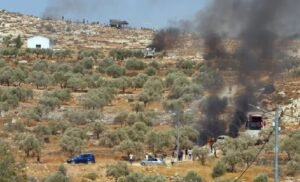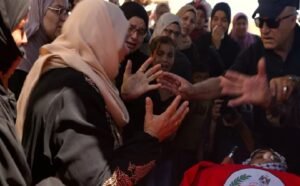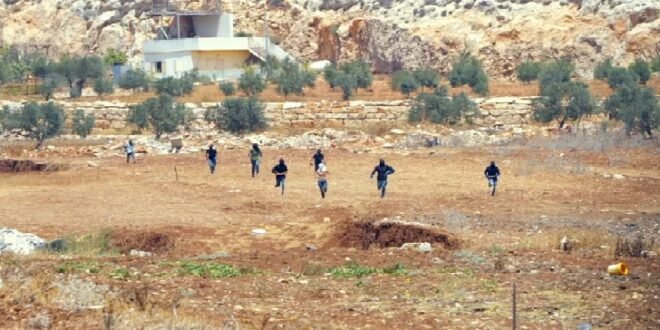20-08-2025
WEST BANK/ GAZA CITY: From among the broken remains of Brahim Hamaiel’s olive trees, in the occupied West Bank, we saw the masked men approach.
A dozen settlers, charging down from the illegal outpost above his farm and across the field towards us, moving fast and carrying large sticks.
 A sudden and unprovoked attack.
A sudden and unprovoked attack.
Brahim had been showing us the trees he said had been hacked to pieces this week by settlers from the outpost.
His family have farmed olives here on land near Turmus Aya, for generations, making it a target for extremist settlers who think killing Palestinian trees and livestock will also kill the idea of a Palestinian State, by forcing residents like Brahim off their land.
“Fear is natural,” Brahim had told me, looking up at the ridge where tarpaulin flapped at the settlers’ lookout post in front of a few caravans and makeshift homes but “there’s something stronger than fear that drives me to stay here, the scent of my ancestors and an attachment dating back hundreds of years even if I pay the price with my blood.”
As the masked men run towards us, we pull back to the road and drive a safe distance away.
Within minutes, some of Brahim’s neighbors from the surrounding farms and villages gather with catapults and stones to confront the attackers.
Vegetation by the side of the road is set on fire, its smoke signaling the site of the confrontation, as settlers on a quad bike chase away a volunteer emergency crew trying to reach a farmhouse in the middle of the field.
This is now a familiar routine. Palestinians living in these villages south of Nablus say there are attacks and confrontations on their lands every week, and that settlers are using these kinds of tactics to take over the land, field by field but the speed and spread of this attack is breathtaking.
In little more than an hour, dozens of settlers had fanned out across the hills. We watched as they broke into an isolated building, and methodically set fire to vehicles and homes. Shepherds on the furthest ridge rushed their flocks away, as the hillside behind them broke into flames, smoke billowing up from several places.
 By then, Palestinians arriving from across the area to help their neighbors found the main access road blocked by the Israeli army, as the destruction continued.
By then, Palestinians arriving from across the area to help their neighbors found the main access road blocked by the Israeli army, as the destruction continued.
One Palestinian was reportedly beaten by settlers and the army later told us that both sides had hurled rocks at each other, and that Palestinians had burned tyres. It said four Israeli civilians received medical treatment at the scene.
Among the crowd waiting near the army roadblock, we found Rifa Said Hamail, her frantic gestures giving way to a warm smile and embrace when we spoke to her.
Since the beginning of last year, it says, some 100 outposts have appeared across the West Bank. It also found that hundreds of square kilometres of land had been taken over by settlers in the past few years using the same violent pattern of intimidation, encouraged, it says, by government support and a lack of proper law enforcement by Israel.
Last week, Israel’s far-right Finance Minister, Bezalel Smotrich, announced the creation of thousands of new housing units in a large West Bank settlement bloc further south, saying it would “bury the idea of a Palestinian state”.
Since 5 to 11 August, the UN Office for Humanitarian Affairs documented at least 27 settler attacks against Palestinians that resulted in casualties, property damage or both, across two dozen different communities. These attacks, it said, led to the displacement of 18 households. (BBC)
 Pressmediaofindia
Pressmediaofindia




